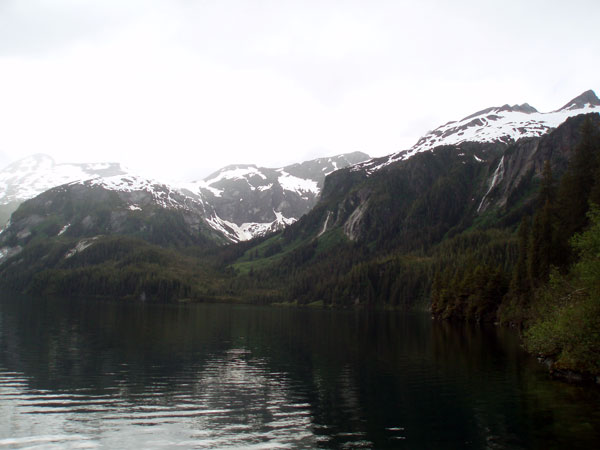
U.S. officials have once more ruled against a private company that wants to develop a controversial hydro-electric plant near Petersburg. The Federal Energy Regulatory Commission (FERC) last week re-affirmed its decision not to give Cascade Creek LLC another exclusive permit for the site.
Cascade Creek asked for a rehearing early this year after FERC denied the company’s bid for a third preliminary permit. The Bellingham-based company had already held two such permits in a row, giving it a total of six years with priority rights to draft and submit a license application for a hydro plant at the mountaintop lake.
FERC this month turned-down the re-hearing request and repeated its earlier decision to end Cascade’s licensing process and deny the company a third preliminary permit.
Commission spokesperson Celeste Miller says, “The commission did affirm staff’s finding that Cascade Creek did not pursue development of its license application in good faith and with due diligence during the term of the second preliminary permit to warrant a third preliminary permit.”
For instance, FERC maintains that Cascade Creek didn’t meet requirements that they work in consultation with resource management agencies and other stakeholders.
“The record indicates that Cascade Creek did not meaningfully respond to the agency and stakeholder concerns including commission staff concerns and therefore did not resolve study request issues in a timely manner. As a result, most of the documents submitted by cascade creek submitted for review by our staff or other agencies included significant gaps or defects,” Miller says.
The proposed hydro site is located at Swan Lake in Thomas Bay, on the mainland about 15 miles northeast of Petersburg. It’s a popular hunting, fishing and camping area and the project has long been a controversial one in town, where local residents and resource agencies have raised many concerns about potential impacts to the environment. The company submitted a draft Environmental Assessment (EA) along with a draft license application for the project back in February 2011, just as its second preliminary permit expired.
Forest Service Energy Coordinator Barbara Stanley says her agency and others, like the Alaska department of fish and game, had asked the company to perform certain field studies and provide the results for review.
“We were able to review to review some of them. Some of the fieldwork was not accomplished in a timely manner. And the company went ahead and filed the EA and license application with FERC before much of the requested field work had been completed. So, from our viewpoint, many of the conclusions in the document were not supported by fieldwork at all,” says Stanley
“Well, the irony of it is we felt we had addressed an awful lot of the issues that came up,” says Cliff Grandison, Co-Chairman of Alaska Hydro. That’s a Canadian Company that took majority ownership of Cascade Creek in the fall of 2010. It was a friendly merger. The idea was to get the company listed on the Toronto Stock Exchange and raise money for the hydro project. According to Grandison, FERC is correct to a point in that he says Cascade Creek was not diligent in providing the information it promised prior to Alaska Hydro’s involvement. But he asserts that FERC is not giving his company enough credit for its work since then.
“We raised the better part of 2 million dollars and we spent that in the better part of about 2 years or less….18 months. That was serious money aggressively trying to get all the permitting done. So, we came in towards the end of the second phase and since there was so much work done after that I think we really earned our right to get a third one and we felt that they would recognize that,” Grandison says.
Cascade Creek’s licensing manager, Chris Spens, declined to comment at this point other than to say the company was reviewing the latest decision and intended to meet with FERC staff.
The FERC order does appear to leave open the possibility that Cascade Creek could try again. It says, “If Cascade wishes to pursue this project, it must submit sufficient information to commission staff to demonstrate that it intends to meaningfully pursue the commissions pre-filing requirements to prepare a license application.”
That includes documenting consultations with resource agencies and responses to their concerns.
The company believes it can meet those requirements, but without a preliminary permit, Cascade Creek and Alaska Hydro risk the possibility that another applicant could jump ahead for a license. According to Grandison, that’s one of the concerns the company hopes to discuss with FERC staff.
“If you have a permit then you are first in line and that allows you some security over the site. In the absence of that then you are relying on the goodwill of FERC to determine whether or not they will accept other applications pending our response to their letter. So, they have a fair amount of flexibility in how they should deal with other applications that may occur,” Grandison says.
And at least one application is still pending for a preliminary permit. It’s from a company called Hydropower LLC which filed last February shortly after FERC denied a third permit to Cascade Creek. Hydropower LLC uses the address and phone number of a Bellingham waste incineration and mining company called Olivine. Olivine has partnered with another Bellingham company called Tollhouse Energy on biomass and solid-waste-to-energy projects in the past. Tollhouse used to own Cascade Creek. However, officials with both Cascade Creek and Hydro Development LLC have said they are not working together.
Meanwhile, Alaska Hydro Stock closed at two cents a share on the Toronto Stock exchange Monday. That’s a drop of nearly 56 percent from the end of last week and it’s down nearly 90 percent since it started trading in the fall of 2010.
Matt Lichtenstein is a reporter at KFSK in Petersburg.




